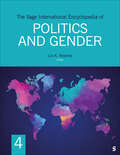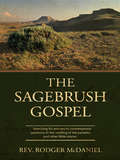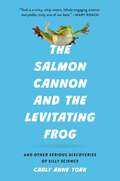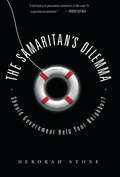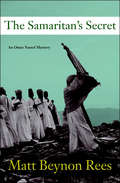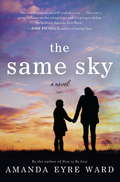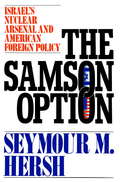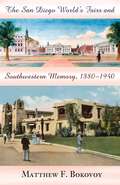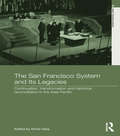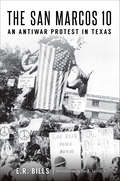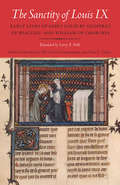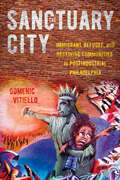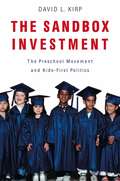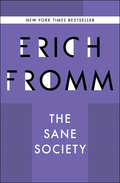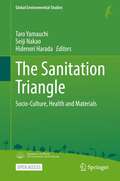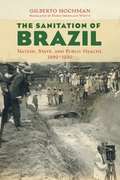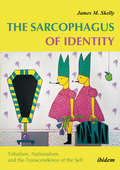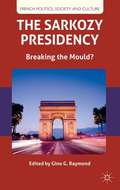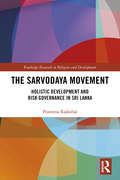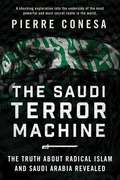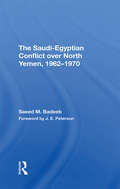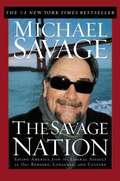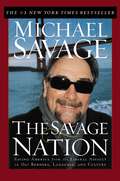- Table View
- List View
The Sage International Encyclopedia of Politics and Gender
by Lia K. RobertsThis four-volume encyclopedia set is organized to allow the reader to explore gender and politics from an updated interdisciplinary, intersectional, and global perspective. The organization format will be an A-Z approach of approximately 500-600 entries (with entries ranging in word count from 1,500-3,000 words, with some entries on foundational topics at around 5,000). Coverage will examine both the role gender plays within the realm of politics (political participation, leadership, etc.) as well as policies that are based in gender (abortion and reproductive policies, transgender rights, etc.). Foundational topics will include entries such as "International Security and Gender," which will introduce gender and war, human trafficking, gender and militarism, and women and terrorism; and, "International Relations and Gender," which will introduce topics such as gender mainstreaming, the Convention on the Elimination of All Forms of Discrimination Against Women (CEDAW), and eco-feminism. A "Comparative Politics" foundational entry will focus on research areas surrounding political representation and participation, legislative processes, and law such as: gender quotas, gender gap in political participation and leadership, intersectionality (and barriers in representation and leadership), Ni Unos Menos/Not One Less Movement (recent significant activist movements), and transgender specific law. Concepts connected to feminist and queer theory as applied in regional studies will also be covered. For example, "marianismo" or the connection between Catholicism and gender roles in Latin American and Latinx communities, Asian American and Pacific Islander (AAPI) voters and political mobilization, and LGBQTIA leaders and social movements will be included. This encyclopedia will be essential for any undergraduate or graduate course on gender studies (in gender studies programs as well as sociology, political science, history or other related programs/disciplines), gender and politics, international relations and gender or area specific courses such as Gender and Latin American Politics or Gender and African Studies.
The Sagebrush Gospel: Searching for answers to contemporary questions in the retelling of the parables and other Bible stories.
by Rodger McdanielMcDaniel's critical examination of the state of the world searches for answers to contemporary questions about oppression and greed. He interprets the parables and other Bible stories adapting their messages to our times with wit and sharp commentary.
The Sainte-Chapelle and the Construction of Sacral Monarchy
by Meredith CohenThis book offers a novel perspective on one of the most important monuments of French Gothic architecture, the Sainte-Chapelle, constructed in Paris by King Louis IX of France between 1239 and 1248 especially to hold and to celebrate Christ's Crown of Thorns. Meredith Cohen argues that the chapel's architecture, decoration, and use conveyed the notion of sacral kingship to its audience in Paris and in greater Europe, thereby implicitly elevating the French king to the level of suzerain, and establishing an early visual precedent for the political theories of royal sovereignty and French absolutism. By setting the chapel within its broader urban and royal contexts, this book offers new insight into royal representation and the rise of Paris as a political and cultural capital in the thirteenth century.
The Salmon Cannon and the Levitating Frog: And Other Serious Discoveries of Silly Science
by Carly Anne YorkA brilliant new voice in science writing—"witty, whip-smart, truly one of our best" (Mary Roach)—shows why playfulness and curiosity are the key to science Why would anyone research how elephants pee? Or study worms who tie themselves into a communal knot? Or quantify the squishability of a cockroach? It all sounds pointless, silly, or even disgusting. Maybe it is. But in The Salmon Cannon and the Levitating Frog, Carly Anne York shows how unappreciated, overlooked, and simply curiosity-driven science has led to breakthroughs big and small. Got wind power? You might have humpback whales to thank. Know anything about particle physics? Turns out there is a ferret close to the heart of it all. And if you want to keep salmon around, be thankful for that cannon! The research itself can seem bizarre. But it drives our economy. And what&’s more, this stuff is simply cool. York invites readers to appreciate the often unpredictable journey of scientific exploration, highlighting that the heart of science lies in the relentless pursuit of knowledge for its own sake. Emphasizing the hard work of the people behind the discoveries, this is an accessible, story-driven book that shows how important and exciting it is to simply let curiosity run wild.
The Salvador Option
by Russell CrandallEl Salvador's civil war between the Salvadoran government and Marxist guerrillas erupted into full force in early 1981 and endured for eleven bloody years. Unwilling to tolerate an advance of Soviet and Cuban-backed communism in its geopolitical backyard, the US provided over six billion dollars in military and economic aid to the Salvadoran government. El Salvador was a deeply controversial issue in American society and divided Congress and the public into left and right. Relying on thousands of archival documents as well as interviews with participants on both sides of the war, The Salvador Option offers a thorough and fair-minded interpretation of the available evidence. If success is defined narrowly, there is little question that the Salvador Option achieved its Cold War strategic objectives of checking communism. Much more difficult, however, is to determine what human price this 'success' entailed - a toll suffered almost entirely by Salvadorans in this brutal civil war.
The Samaritan's Dilemma: Should Government Help Your Neighbor?
by Deborah StonePolitics has become a synonym for all that is dirty, corrupt, dishonest, compromising, and wrong. For many people, politics seems not only remote from their daily lives but abhorrent to their personal values. Outside of the rare inspirational politician or social movement, politics is a wasteland of apathy and disinterest. It wasn't always this way. For Americans who came of age shortly after World War II, politics was a field of dreams. Democracy promised to cure the world's ills. But starting in the late seventies, conservative economists promoted self-interest as the source of all good, and their view became public policy. Government's main role was no longer to help people, but to get out of the way of personal ambition. Politics turned mean and citizens turned away. In this moving and powerful blend of political essay and reportage, award-winning political scientist Deborah Stone argues that democracy depends on altruism, not self-interest. The merchants of self-interest have divorced us from what we know in our pores: we care about other people and go out of our way to help them. Altruism is such a robust motive that we commonly lie, cheat, steal, and break laws to do right by others. "After 3:30, you're a private citizen," one home health aide told Stone, explaining why she was willing to risk her job to care for a man the government wanted to cut off from Medicare. The Samaritan's Dilemma calls on us to restore the public sphere as a place where citizens can fulfill their moral aspirations. If government helps the neighbors, citizens will once again want to help govern. With unforgettable stories of how real people think and feel when they practice kindness, Stone shows that everyday altruism is the premier school for citizenship. Helping others shows people their common humanity and their power to make a difference. At a time when millions of citizens ache to put the Bush and Reagan era behind us and feel proud of their government, Deborah Stone offers an enormously hopeful vision of politics.
The Samaritan's Secret (An Omar Yussef Mystery #3)
by Matt ReesThe third installment in the CWA Dagger-winning series featuring Palestinian schoolteacher-detective Omar Yussef. The Samaritan community in Palestine is tiny but ancient—only about six hundred people still adhere to this faith, an offshoot of Judaism, and now one of them has been murdered. The crime has even larger implications, though, as the dead man controlled hundreds of millions of dollars of government money. If the World Bank cannot locate it within the next several days, all aid to the Palestinians will be cut off. Visiting the isolated Samaritan community at Nablus in the West Bank, history teacher-turned-sleuth Omar Yussef must solve the murder and find the money for the sake of all Palestine.
The Same Sky
by Amanda Eyre Ward'Puts a human face to the story of undocumented youth desperately seeking their dreams in America. This one's going to haunt me for a long time' Jodi PicoultA beautiful and heartrending novel about motherhood, resilience, and faith-a ripped-from-the-headlines story of two families on both sides of the American border.Carla is a strong-willed young girl who's had to grow up fast, acting as caretaker to her six-year-old brother Junior. Years ago, her mother left the family behind in Honduras to make the arduous, illegal journey to Texas. But when Carla's grandmother dies and violence in the city escalates, Carla takes fate into her own hands-and with Junior, she joins the thousands of children making their way across Mexico to America, facing great peril for the chance at a better life.Alice and her husband, Jake, own a barbecue restaurant in Austin, Texas. Hardworking and popular in their community, they have a loving marriage and thriving business, but Alice still feels that something is missing, lying just beyond reach.
The Samson Option
by Seymour M. HershAn investigation into Israel's nuclear capabilities discloses information about the country's rush toward nuclear status, its collaboration with South Africa and Iran, and its espionage activities.
The San Diego World's Fairs and Southwestern Memory, 1880-1940
by Matthew F. BokovoyIn the American Southwest, no two events shaped modern Spanish heritage more profoundly than the San Diego Expositions of 1915-16 and 1935-36. Both San Diego fairs displayed a portrait of the Southwest and its peoples for the American public. The Panama-California Exposition of 1915-16 celebrated Southwestern pluralism and gave rise to future promotional events including the Long Beach Pacific Southwest Exposition of 1928, the Santa Fe Fiesta of the 1920s, and John Steven McGroarty's The Mission Play. The California-Pacific International Exposition of 1935-36 promoted the Pacific Slope and the consumer-oriented society in the making during the 1930s. These San Diego fairs distributed national images of southern California and the Southwest unsurpassed in the early twentieth century.By examining architecture and landscape, American Indian shows, civic pageants, tourist imagery, and the production of history for celebration and exhibition at each fair, Matthew Bokovoy peels back the rhetoric of romance and reveals the legacies of the San Diego World's Fairs to reimagine the Indian and Hispanic Southwest. In tracing how the two fairs reflected civic conflict over an invented San Diego culture, Bokovoy explains the emergence of a myth in which the city embraced and incorporated native peoples, Hispanics, and Anglo settlers to benefit its modern development.
The San Francisco System and Its Legacies: Continuation, Transformation and Historical Reconciliation in the Asia-Pacific (Asia's Transformations)
by Kimie HaraIn September 1951, Japan signed a peace treaty with forty-eight countries in San Francisco; in April 1952, the treaty came into effect. The San Francisco Peace Treaty is an international agreement that in significant ways shaped the post–World War II international order in the Asia-Pacific. With its associated security arrangements, it laid the foundation for the regional structure of Cold War confrontation: the "San Francisco System" fully reflected the strategic interests and policy priorities of the peace conference’s host nation, the United States. The treaty fell far short of settling outstanding issues in the wake of the Pacific War or facilitating a clean start for the "post-war" period. Rather, critical aspects of the settlement were left equivocal, and continue to have significant and worrisome implications for regional international relations. This book examines the key developments of the contentious political and security issues in the Asia-Pacific that share a common foundation in the post-war disposition of Japan, particularly the San Francisco Peace Treaty. These include both tangible and intangible issues, such as disputes over territories and "history" problems. Taking the San Francisco System as its conceptual grounding, the authors examine how these issues developed and have remained contentious long after the San Francisco arrangements. To provide bases for producing solutions, the chapters offer comprehensive accounts that explain and deepen our understanding of these complex regional issues and the San Francisco System as a whole. By closely and systematically examining the legacy and various ramifications of the San Francisco System, this fascinating book adds to our understanding of current and growing tensions in the region. As such, it will be of great interest to students and scholars of Asian studies, history, international relations and politics.
The San Marcos 10: An Antiwar Protest in Texas
by E.R. BillsOn November 13, 1969, ten students at Texas State University were suspended for participating in a peaceful protest against the Vietnam War. They had kept vigil in front of the Huntington Mustangs, bearing signs that read,"Vietnam Is an Edsel" and "44,000 U.S. Dead, For What?" while an increasingly hostile anti-protest crowd chanted, "Love it or leave it!" and "Let's string 'em up!" It was a day after news of the My Lai massacre broke. Part of a coordinated, nationwide Vietnam Moratorium effort that confounded and infuriated the Nixon White House, the "San Marcos 10" challenged their suspension, taking their case all the way to the United States Supreme Court. Author E.R. Bills offers this fascinating glimpse into the 1960s antiwar movement in Texas, the extraordinary measures to quell it and the broader social activism in which it participated.
The Sanctity of Louis IX: Early Lives of Saint Louis by Geoffrey of Beaulieu and William of Chartres
by Geoffrey Of Beaulieu William Of ChartresLouis IX of France reigned as king from 1226 to 1270 and was widely considered an exemplary Christian ruler, renowned for his piety, justice, and charity toward the poor. After his death on crusade, he was proclaimed a saint in 1297, and today Saint Louis is regarded as one of the central figures of early French history and the High Middle Ages. In The Sanctity of Louis IX, Larry F. Field offers the first English-language translations of two of the earliest and most important accounts of the king’s life: one composed by Geoffrey of Beaulieu, the king’s long-time Dominican confessor, and the other by William of Chartres, a secular clerk in Louis’s household who eventually joined the Dominican Order himself. Written shortly after Louis’s death, these accounts are rich with details and firsthand observations absent from other works, most notably Jean of Joinville’s well-known narrative The introduction by M. Cecilia Gaposchkin and Sean L. Field provides background information on Louis IX and his two biographers, analysis of the historical context of the 1270s, and a thematic introduction to the texts. An appendix traces their manuscript and early printing histories. The Sanctity of Louis IX also features translations of Boniface VIII’s bull canonizing Louis and of three shorter letters associated with the earliest push for his canonization. It also contains the most detailed analysis of these texts, their authors, and their manuscript traditions currently available.
The Sanctuary City: Immigrant, Refugee, and Receiving Communities in Postindustrial Philadelphia
by Domenic VitielloIn The Sanctuary City, Domenic Vitiello argues that sanctuary means much more than the limited protections offered by city governments or churches sheltering immigrants from deportation. It is a wider set of protections and humanitarian support for vulnerable newcomers. Sanctuary cities are the places where immigrants and their allies create safe spaces to rebuild lives and communities, often through the work of social movements and community organizations or civil society. Philadelphia has been an important center of sanctuary and reflects the growing diversity of American cities in recent decades. One result of this diversity is that sanctuary means different things for different immigrant, refugee, and receiving communities. Vitiello explores the migration, settlement, and local and transnational civil society of Central Americans, Southeast Asians, Liberians, Arabs, Mexicans, and their allies in the region across the late twentieth and early twenty-first centuries. Together, their experiences illuminate the diversity of immigrants and refugees in the United States and what is at stake for different people, and for all of us, in our immigration debates.
The Sandbox Investment: The Preschool Movement and Kids-First Politics
by David L. KirpListen to a short interview with David L. Kirp Host: Chris Gondek | Producer: Heron & Crane The rich have always valued early education, and for the past forty years, millions of poor kids have had Head Start. Now, more and more middle class parents have realized that a good preschool is the smartest investment they can make in their children's future in a competitive world. As The Sandbox Investment shows, their needs are key to the growing call for universal preschool. Writing with the verve of a magazine journalist and the authority of a scholar, David L. Kirp makes the ideal guide to this quiet movement. He crouches in classrooms where committed teachers engage lively four-year-olds, and reveals the findings of an extraordinary longitudinal study that shows the life-changing impact of preschool. He talks with cutting-edge researchers from neuroscience and genetics to economics, whose findings increasingly show how powerfully early childhood shapes the arc of children's lives. Kids-first politics is smart economics: paying for preschool now can help save us from paying for unemployment, crime, and emergency rooms later. As Kirp reports from the inside, activists and political leaders have turned this potent idea into campaigns and policies in red and blue states alike. The Sandbox Investment is the first full story of a campaign that asks Americans to endorse a vision of society that does well by doing good. For anyone who is interested in politics or the social uses of research--for anyone who's interested in the children's futures--it's a compelling read.
The Sane Society (Psicologia Y Psicoan Ser.)
by Erich FrommA New York Times bestseller about overcoming the profound ills of modern society by a legendary social psychologist, the author of Escape from Freedom. One of Fromm&’s main interests was to analyze social systems and their impact on the mental health of the individual. In this study, he reaches further and asks: &“Can a society be sick?&” He finds that it can, arguing that Western culture is immersed in a &“pathology of normalcy&” that affects the mental health of individuals. In The Sane Society, Fromm examines the alienating effects of modern capitalism, and discusses historical and contemporary alternatives, particularly communitarian systems. Finally, he presents new ideas for a re-organization of economics, politics, and culture that would support the individual&’s mental health and our profound human needs for love and freedom. This ebook features an illustrated biography of Erich Fromm including rare images and never-before-seen documents from the author&’s estate.
The Sanitation Triangle: Socio-Culture, Health and Materials (Global Environmental Studies)
by Taro Yamauchi Seiji Nakao Hidenori HaradaThis open access book deals with global sanitation, where SDG 6.2 sets a target of enabling access to sanitation services for all, but has not yet been achieved in low- and middle-income countries. The transition from the United Nations MDGs to the SDGs requires more consideration based on the socio-cultural aspects of global sanitation. In other words, equitable sanitation for those in vulnerable situations could be based on socio-cultural contexts. Sanitation is a system that comprises not only a latrine but also the works for the treatment and disposal of human waste. Sanitation systems do not function by themselves but have significance only through social management. The process of decision-making also largely depends on socio-cultural conditions, and the importance of sanitation needs to be socially acknowledged. The health benefits of sanitation improvement—among the significant contributions of sanitation—also need to be considered in the socio-cultural milieu. Further, the social-culture itself is affected, and potentially even created, by sanitation. In this context, more progress on the improvement of sanitation requires a more holistic approach across disciplines.In this book, we present the concept of the Sanitation Triangle, which considers the interconnections of health, materials, and socio-culture in sanitation, as a holistic approach, and the case studies based on the Sanitation Triangle by diverse disciplines such as Cultural Anthropology, Development Studies, Health Sciences, Engineering, and Science Communication. By the deep theoretical examinations and inter-dialogues between the different disciplines, this book explores the potentialities of inter-disciplinary studies on global sanitation.
The Sanitation of Brazil: Nation, State, and Public Health, 1889-1930
by Diane Grosklaus Whitty Gilberto HochmanCelebrated as a major work since its original publication, The Sanitation of Brazil traces how rural health and sanitation policies influenced the formation of Brazil's national public health system. Gilberto Hochman's pioneering study examines the ideological, social and political forces that approached questions of health and government action. The era from 1910 to 1930 offered unique opportunities for public health reform, and Hochman examines its successes and failures. He looks at how health became a state concern, tying the emergence of public health policies to a nationalistic movement and to a convergence of the elites' social consciousness with their political and material interests. Politicians weighed the costs and benefits of state-run public health versus the burdens imposed by disease. Physicians and intellectuals, meanwhile, swayed them with warnings that endemic disease and official neglect might affect everyone--rich and poor, rural and urban, interior and coastal--if left unchecked. The book shows how disease and health were and are associated with nation-state building in Brazil.
The Sarcophagus of Identity: Tribalism, Nationalism, and the Transcendence of the Self
by James SkellyGiven the increasing centrality of identity to contemporary politics, James Skelly's book provides a critical and useful analysis of the dominant and problematic conceptual bases for self and identity. Inspired in part by his lawsuit against the U.S. Secretary of Defense while serving as an active duty military officer, Skelly argues that our use of language in the construction of identities is unwitting, unreflective, and has engendered horrific consequences for tens of millions of humans. In contrast, he demonstrates our need to overcome sectarian modes of thinking and to engage in much deeper forms of solidarity with others by foregrounding a species identity.This book offers not only an academic reflection on the concept of identity but one that delves into the nature of the self and identity by drawing on Skelly's concrete experience of attempting to present a self-identity opposed to war in the face of the political, psychological, religious, and legal arguments put forth in a year-long legal battle with the United States government. Skelly argues that to create a new and more pacific human sensibility we must help ourselves and others to gain sovereignty over our social worlds and the definition of "who we are" by arming individuals with the tools necessary to overcome the definitions and categorizations we are subjected to in the construction of traditional notions of identity.
The Sarkozy Presidency
by Gino G. RaymondSarkozy came to power promising radical political and social change while simultaneously developing a presidential persona that melded the public and the personal under the glare of media attention, unparalleled in the French Fifth Republic. This volume provides a detailed analysis of the fit between his ambitions and the outcomes of his presidency
The Sarvodaya Movement: Holistic Development and Risk Governance in Sri Lanka (Routledge Research in Religion and Development)
by Praveena RajkobalThis book provides an important case study of how local cultures, religions and spiritualities can enhance development activities, and provide helpful frameworks for contemporary societies facing the pressures of neo-liberalism. It specifically traces how the influential Sri Lankan Sarvodaya Movement has deployed concepts of spirituality-based holistic development to help local communities with post-tsunami reconstruction and redevelopment. Throughout, the author provides a Three-Sphere conceptualisation of holistic sustainable development, focused on Culture, Economics and Power, slightly revising Sarvodaya’s Three-Sphere model comprising Spirituality, Economics and Power. The author contends that the success of holistic development, including risk governance, is largely contingent on an awareness of the interdependency of these three spheres, and establishing equitable partnerships between communities, NGOs, INGOs, States and the private sector. Overall, this book argues that religion, spirituality and non-religious worldviews play an important role among other resources concerned with how to survive the pressures of neo-liberalism and environmental risks and crises. The Sarvodaya Movement, which draws on Buddhist concepts of spirituality, is widely acknowledged as an important example of spirituality and community-driven development, and as such, this book will be of interest to scholars of Development and Humanitarian Studies, Religious Studies and South Asian Studies.
The Saudi Terror Machine: The Truth About Radical Islam and Saudi Arabia Revealed
by Pierre ConesaThe religious diplomacy of Saudi Arabia constitutes a strange black hole in the analysis of radicalism that affects Islam and the Middle East today. Why has Salafism, the most intolerant and sectarian movement of Islam, become so prevalent? Of all the religious radicalisms that rot the planet, it is the only one to enjoy the constant support of a country endowed with immense means: the Saudi kingdom. This study, whose collaborators wanted to remain anonymous, reveals how the two sides of the kingdom – the conciliatory one of the Saud dynasty and the more aggressive Salafism, propagandist of jihad – has for decades developed a religious strategy to conquer the Muslim community and the West without appearing as an enemy. One of the most striking examples is the absence of sanctions or even accusations by George W. Bush towards Saudi Arabia in the aftermath of the September 11th attacks even with fifteen identified Saudis among the terrorists. The kingdom's influence is largely unknown but undoubtedly acts as a key player throughout the Muslim world through their financing of conservative Koranic schools, universities and mosques, as well as other international public and private organizations. But after years of financing radical Islamists in foreign lands, Saudi Arabia now finds itself threatened in their own territory, the monster they have given birth to turned against them.
The Saudi-egyptian Conflict Over North Yemen, 1962-1970
by Saeed M BadeebThe 1962 coup d'état in North Yemen initiated one of the most debilitating Middle East conflicts ever, the eight-year civil war in North Yemen. This conflict in an obscure corner of the Arab world eventually assumed global importance, attracting the attention of the superpowers and the United Nations. This book focuses on the Yemeni civil war's impact at the regional level, where it provoked enmity between two influential Arab states, Saudi Arabia and Egypt. Dr. Badeeb argues that for Egypt, the war constituted a means of intensifying and confirming its role as the leader of the revolutionary camp in the Arab world. For Saudi Arabia, however, it presented a direct challenge to the security and stability of the kingdom. Dr. Badeeb provides a valuable elucidation of Saudi Arabia's concern over Yemen as a potential source of political and strategic upheaval. This lately unappreciated aspect of the regional security picture is in part a legacy of the Saudi-Egyptian conflict of the 1960s and is one of the central elements of current Saudi security policy.
The Savage Nation, Saving America From The Liberal Assault On Our Borders, Language And Culture
by Michael SavageStraight-talking radio personality, Dr. Michael Savage brings his radio message of borders, language and culture to hardcover in this fast-paced, well-outlined attack on the liberal ethos he blames for a declining America, Savage points out how the ACLU and other liberal groups are the new Communists intent on destroying our constitutional republic with their unmitigated assault on our national borders, English language and Judeo-Christian, Western culture. No matter what you believe, you will enjoy this well-written story of an immigrant's son and his thoughts on America and our future.
The Savage Nation: Saving America from the Liberal Assault on Our Borders, Language and Culture
by Michael SavageMichael Savage attacks big government and liberal media bias. The son of immigrants, Savage shows how traditional American freedoms are being destroyed from the outside and undermined from within-not just our own government, but also from alien forces within our own society. Savage argues that if the price of liberty is eternal vigilance, then only a more "savage nation" will enjoy these liberties. Savage's high ratings and the rapid growth of his program prove he is in touch with the concerns of the average American.
